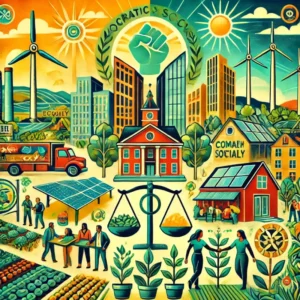Introduction:
Navigating the Complex Terrain of Political Ideologies
 In the contemporary political landscape, the terms “democratic socialism” and “communism” often spark intense debate, confusion, and misconceptions. Misunderstandings between these ideologies blur the lines of discourse, leading to polarized views and a diluted understanding of their principles, goals, and societal impacts. This article aims to demystify democratic socialism and communism, providing a clear, factual comparison that distinguishes their historical roots, core tenets, and real-world applications.
In the contemporary political landscape, the terms “democratic socialism” and “communism” often spark intense debate, confusion, and misconceptions. Misunderstandings between these ideologies blur the lines of discourse, leading to polarized views and a diluted understanding of their principles, goals, and societal impacts. This article aims to demystify democratic socialism and communism, providing a clear, factual comparison that distinguishes their historical roots, core tenets, and real-world applications.
By diving into this comprehensive analysis, readers will gain insight into the importance of these distinctions in shaping informed, nuanced political discussions. Join us as we unveil the truth behind these often-confused ideologies, fostering a deeper understanding of their roles in contemporary and future socio-political landscapes.
Whether you are a political science enthusiast, a student seeking clarity, or a concerned citizen navigating the complexities of modern governance, this exploration offers valuable perspectives on two influential, yet widely misunderstood, political theories.
Historical Background:
The Roots of Ideological Diversity
Democratic socialism and communism share a historical foundation in the critique of capitalism, yet they diverge significantly in philosophy and implementation. Karl Marx laid the groundwork for both ideologies, envisioning a classless society.
However, the paths diverged with figures like Vladimir Lenin emphasizing revolution to achieve a communist state, while democratic socialists sought change through democratic means, highlighting the importance of political pluralism and social justice.
Defining Democratic Socialism:
Equity Through Democracy
Democratic socialism focuses on achieving social equity and justice within a democratic framework. It advocates for significant government intervention in the economy to redistribute wealth, provide essential services, and ensure public welfare, all while supporting democratic freedoms and elections.
Scandinavian countries often serve as case studies, with their comprehensive welfare states, progressive taxation, and high standards of living. Figures like George Orwell and Nelson Mandela exemplify the ideology’s broad appeal, emphasizing its commitment to democracy and social justice.
Unpacking Communism and the Evolution of China’s Socialist Model
The Ideals and Realities of Communism
Communism, as envisioned by Marx and Engels, aspires to create a society devoid of classes and states, where the community collectively owns and manages all resources. This ideology advocates for the elimination of private property to achieve a society that is both stateless and classless, epitomizing equality and collective governance.
Despite its lofty ideals, the implementation of communism in countries like the Soviet Union and China often diverged significantly from these principles, resulting in central planning, state control, and, often, authoritarian regimes. This divergence underscores the inherent challenges in transforming theoretical ideologies into practical governance.
From Maoist Communism to “Socialism with Chinese Characteristics”
China’s political and economic journey presents a fascinating case study in the adaptation and evolution of socialist principles. Under Mao Zedong, the People’s Republic of China initially embraced a strict form of communism. However, the landscape began to shift dramatically with the economic reforms introduced by Deng Xiaoping in the late 20th century.
These reforms marked the transition to what is now recognized as “socialism with Chinese characteristics,” a system that marries state oversight of crucial economic sectors with market-driven practices. This approach helps private enterprise and foreign investment, albeit within a framework controlled by the state. By using market efficiencies, China aims to fulfill socialist goals, creating a distinctive system that stands apart from both traditional communism and capitalist models prevalent in the West.
Bridging Ideology and Practice in China’s Unique Socialist Model
The evolution of China’s governance and economic model illuminates the complexities involved in applying political ideologies to the nuanced realities of a country’s historical, cultural, and economic fabric. Today’s China, governed by the Communist Party, stands for a hybrid system that deftly combines socialist principles with market economics.
This blend not only challenges the binary classification of countries as purely communist or capitalist but also reflects a pragmatic approach to achieving socialist goals of development and prosperity. Through this lens, China’s current model underscores the nuanced reality of its political and economic systems, rooted in socialism but dynamically engaging with global market forces to chart its own path forward.
This narrative repositioning offers a clearer understanding of communism’s theoretical ambitions versus its practical applications, especially in the context of China’s unique adaptation. It highlights the country’s journey from a rigidly communist ideology towards a flexible, market-influenced socialist framework, illustrating the dynamic interplay between ideology and pragmatism in shaping modern governance and economic strategies.
Key Differences:
Governance, Freedom, and the Economy
The primary distinction between democratic socialism and communism lies in their approaches to economic management, political freedoms, and the role of the state. Democratic socialism supports a mixed economy and political pluralism, advocating for social reforms through democratic means. Communism, in contrast, pushes for the abolition of private property and the establishment of a communal economy, which historically has led to centralized control and limited political freedoms.
Democratic Socialism in the Modern World:
Perceptions and Realities
Today, democratic socialism influences several global policies, advocating for social welfare, environmental sustainability, and economic equality. Despite misconceptions, its modern proponents look to address the inequalities worsened by pure market economies, arguing for a balanced approach that fosters both economic dynamism and social welfare.
Critiques of Neoliberalism:
A Comparative Analysis
Neoliberalism, with its emphasis on free markets, deregulation, and privatization, contrasts sharply with both democratic socialism and communism. Critics argue that neoliberal policies worsen inequality and neglect social welfare, calling for a re-evaluation of its dominance in global economics and proposing alternatives that emphasize social equity and public welfare.
Case Study:
The Liberal National Party (LNP) of Australia
Examining the LNP’s policies offers insight into contemporary political dynamics, contrasting its neoliberal tendencies with democratic socialist principles. The LNP’s approach to economic management, social welfare, and environmental policy provides a practical lens through which to assess the impact of neoliberalism and the potential benefits of alternative ideologies.
The Role of Political Labels and Misconceptions

The misuse of political labels in public discourse often leads to confusion and misunderstanding, hindering productive political dialogue. By examining the nuanced differences and contexts of these ideologies, we can move towards a more informed and constructive political conversation, emphasizing the importance of understanding over labelling.
Through this comprehensive exploration, we aim to foster a deeper understanding of democratic socialism and communism, challenging readers to engage with political ideologies beyond surface-level misconceptions and to take part actively in informed discussions about our collective future.
Conclusion:
Navigating Ideological Landscapes
As we reach the culmination of our exploration into democratic socialism versus communism, it is imperative to reflect on the key insights uncovered through this discourse. The journey from their historical roots to their modern implications highlights the necessity of distinguishing these ideologies, not just in academic circles but in everyday political conversations.
Summary of Key Findings
Our analysis revealed significant distinctions between democratic socialism and communism, notably in their approaches to economic policies, political freedoms, and the role of government. Democratic socialism advocates for a mixed economy where the government and private sector coexist, emphasizing social welfare and democratic governance. In contrast, communism aims for a classless society where the means of production are communally owned, often leading to authoritarian governance in practice, diverging significantly from its theoretical foundations.
The Importance of Informed Understanding
Understanding the nuances between democratic socialism and communism is crucial in today’s political landscape, marred by oversimplifications and misrepresentations. Mislabelling and misunderstanding these ideologies can hinder productive discourse, leading to polarization and misinformation. An informed electorate is essential for a healthy democracy, where decisions are made based on correct representations of political theories.
Engage in Informed Discussions
We encourage readers to delve deeper into the principles and practices of these ideologies. By fostering informed discussions, we can move beyond stereotypes and engage with the complexities of political ideologies. Let us challenge ourselves to look past the labels, understanding the substantive differences and similarities, and what they mean for our society.
In conclusion, the journey through democratic socialism and communism offers more than just academic insight; it provides a lens through which we can examine our values, policies, and the kind of society we aspire to build. As we navigate the changing tides of political discourse, let our discussions be guided by knowledge, empathy, and a relentless pursuit of justice.
Call to Action: Become a part of the conversation. Educate yourself on these ideologies, discuss them with others, and contribute to a more nuanced and informed political dialogue. Your voice matters in shaping a fairer and understanding world.
Question for Readers: Do you think understanding the differences between democratic socialism and communism is vital for informed political discourse? Why or why not?
References:
The Communist Manifesto: https://www.gutenberg.org/cache/epub/61/pg61-images.html
Envisioning Real Utopias: https://www.aacademica.org/erik.olin.wright/46
Where we go from here: https://en.wikipedia.org/wiki/Where_We_Go_from_Here
Less is More: https://www.booktopia.com.au/less-is-more-jason-hickel/book/9781786091215.html
The Chinese Economy Transitions and Growth: https://valeriaribeiroufabc.wordpress.com/wp-content/uploads/2017/07/barry-naughton-the-chinese-economy-transitions-and-growth.pdf
A Brief History of Neoliberalism: https://www.researchgate.net/publication/273598423_A_Brief_History_of_Neoliberalism
The Price of Inequality: How Today’s Divided Society Endangers Our Future: https://academiccommons.columbia.edu/doi/10.7916/d8-qjpx-4×05/download
The Populist Explosion. How the Great Recession Transformed America and European Politics: https://www.proquest.com/openview/935e148f167166e889fa0c4e3e9b3cbb/1?pq-origsite=gscholar&cbl=2030068
Development as Freedom: https://en.wikipedia.org/wiki/Development_as_Freedom


The book The China Mirage by James Bradley tells a detail of Mao Zedong's battle for modern China in the 20-30s against Chiang Kai-shek which shows how Stalin saw the process to achieve communism was radically different from what Mao wanted to pursue. You need to read the book. Briefly Mao saw he needed to win over the millions of peasants in the countryside whereas Stalin thought that the revolution had to start in the cities. The book details the story of the 28 Bolsheviks Stalin sent to China to take over from Mao which lead to multiple disasters in the battle against Chiang. This included the disaster which lead to Mao's famed Long March to the N west. The disasters with the 28 Bolsheviks kept happening till they had to give up and hand back the leadership to Mao in "disgust". As we know Mao won the battle for modern China causing Chiang to escape to Taiwan producing the situation we know all too well today about China & Taiwan.